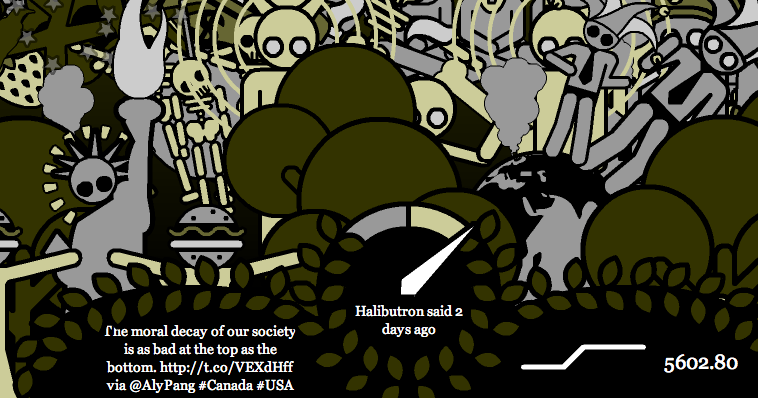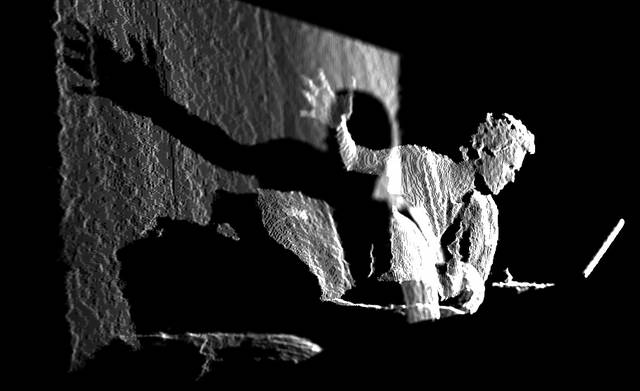Calen sent me this link of two chatbots talking with each other, AI vs. AI. Two chatbots talking to each other. I can’t help thinking the dialogue was scripted, but that doesn’t change the pleasure of imagining a chatbot getting irritated with another.
Category: Streaming Media
The Garden of Error and Decay
The Garden of Error and Decay is a real-time visualization of disasters mentioned in Twitter and other feeds. The text about the interactive says “this innovative moving image format is something like a real-time data driven narrative. This project is not a film, not a game, and not a nonlinear interactive story.” The visualization uses pictograms that represent the type of disaster. You can see the original twitter text.
Thanks to Scott for this.
Defining the Digital Humanities April 6, 2011
Sean pointed me to a YouTube video from Columbia in which Dan Cohen starts the talk by talking about our Day of Digital Humanities. See Research Without Borders: Defining the Digital Humanities April 6, 2011. Dan talks about definitions for the digital humanities and talks about what they do at their Center for History and New Media.
Dan talks about how he doesn’t think there is anything like “armchair digital humanities”. He argues that you learn about technologies like blogging and twitter by doing.
5 Companies Building the “Internet of Things”
ReadWriteWeb has a nice article on 5 Companies Building the “Internet of Things”. I like the phrase “internet of things” – it gives a sense of what we might achieve if objects could be networked. The cool part is that there are now affordable kits that use RFID that can you can buy to start connecting things. I am reminded of a project I learned about at the GRAND meeting called The Reading Glove. Wearing the “reading glove” users pick up “narratively rich objects” that then trigger audio clips that then weave a puzzle narrative.
Converting the Virtual Economy into Development Potential
From Boing Boing I came across this report: Converting the Virtual Economy into Development Potential is a very interesting report on gold farming, microwork and cherry blossoming. The report describes the economics and value chain of these activities. It discusses some of the ethical issues, but is focused on how these activities could provide good work for developing countries.
Troika Ranch
Folks in the Interactives Lab introduced me to Troika Ranch a dance team that performs with multimedia. You can see examples of what they do on their YouTube channel or on Net Television. They have created a real-time media tool called Isadora:
Isadora is the award-winning, graphic programming environment for Macintosh and Windows that provides interactive control over digital media, with special emphasis on the real-time manipulation of digital video.
Because every performance or installation is unique, Isadora was designed not to be a “plug and play” program, but instead to offer building blocks that can be linked together in nearly unlimited ways, allowing you to follow your artistic impulse.
Kinect Hacking and Art Round Table: Why it Matters, What You Need to Know
There is a lot of excitement about the Microsoft Kinect and the potential for adapting their vision technology. Wayne sent me a link to this Music Motion Noise blog entry on Kinect Hacking and Art Round Table: Why it Matters, What You Need to Know.
Time to get one.
Lecture Capture: Research on its Effectiveness
Does recording and then podcasting lectures help learning? I always expected it would be a waste of time that might encourage students to fall behind. According to research I am wrong.
From an email newsletter that I like about teaching called Tomorrow’s Professor I learned about a report from the University of Michigan’s Center for Research on Learning and Teaching on Lecture Capture: A Guide for Effective Use (PDF). The authors, Erping Zhu and Inger Bergom, make some interesting points:
- There is no evidence that student attend less.
- Students can concentrate on listening instead of taking notes when there is going to be a podcast posted. This is a good thing – note taking is not learning.
- Students use podcasts to go over difficult ideas – they can back up and replay. They use captured lectures to review (instead of notes?)
- Videocasts can be more effective than live lectures because students at live lectures can be distracted by the prof (or others), while with video they can concentrate on the slide.
Until now I didn’t think capturing lectures would be worth it, but watching students slavishly take notes at the expense of learning has always bothered me. Telling students to not take notes doesn’t do any good. If they can count on podcasts or video then they might relax and think about the issues.
A Scholar Gets a Kindle and Starts to Read
From Ray I was led to a lecture at Yale by James J. O’Donnell, Provost and Professor of Classics at Georgetown University, on the Kindle, A Scholar Gets a Kindle and Starts to Read. O’Donnell has been involved for a long time in humanities computing, though he is now a provost, and speaks with experience thinking about electronic reading practices. He started with the question from Hugo of whether “this (the Kindle) will kill that (the book)”. This led to reflections on reading practices. “Devices and technologies predict behavior. This device predicts behavior.” He talk, therefore, was around what practices/behaviors does the Kindle (and ebooks more generally) support or predict.
He gives examples of the limitations of the Kindle.
- Annotation: The kindles annotation tools don’t let you manage your notes. O’Donnell uses a blog (like I do) to keep notes, but doesn’t make it public.
- Complex Documents: It is not friendly to complex documents with things like footnotes.
- Non-Linear Reading: Doesn’t let him compare things (a translation and original.) It is like the old scroll – it drives you away from non-linear reading. All you really are encouraged to do is to scroll and scroll and so on.
- Reference Works: Scholars need to be able to use important reference works in standard editions and “that is because books talk to each other.” The Kindle is meant for a person to encounter one book, but not for books to encounter each other.
- Lots of Stuff: The Kindle does have the virtue that it can hold a lot of stuff.
- What Sorts of Practices: O’Donnell describes different reading practices he tried like downloading lots of stuff for reading in free moments. He was very funny about his bedside table as a reading device that holds good intentions. He seems to see the value of the Kindle in getting books you plan to delete. He has bought various books that he expects to dislike and therefore to skim.
- Ludic Reading: He also sees this as potentially for “ludic reading” – the reading of murder mysteries on the train where you don’t expect to keep the book.
- Travel Accessory: He only reads on the Kindle when away from home because there is so much better stuff at home. It is a way to save space when travelling.
- Old Reading: Strangely, the Kindle supports mostly very old reading practices (scrolling). It doesn’t really support any of the newer non-linear practices. There is no innovation in the device – no interesting indexes. For O’Donnell the Kindle fails to replace the book because it doesn’t really innovate, it just remediates without even supporting the full range of practices a good book does.
I can’t help thinking that the iPad will blow the Kindle away. First, the iPad can do so much more than let you read. If you bring the Kindle when traveling to save space, you still need a cell phone, a lap top and so on. The iPad could replace multiple devices the way my iPhone replace two devices (the iPod and the cell phone.) Second, the iPad is open and will let you easily use many formats and use tools like your blog to write annotations and notes. (Wouldn’t it be neat to have an annotation tool built into WordPress that would let you go from the note back to the right spot in an ebook?) The Kindle seems designed to make it easy to buy books from Amazon.
I too, like O’Donnell, got a Kindle for Christmas and have been trying it. One use that stood out immediately for me was the easy of buying. Like iTunes, the Kindle makes it easy to buy books when the book stores are far and closed. I was in a little town in British Columbia hungry for leisure reading and the Kindle made it easy to spend 10 bucks to get some trash right after brushing my teeth when I want to curl into bed with a “book.” You can also (sort of) read in bed. The Kindle is light enough to hold with one hand, something the iPad may not be. That said, now that I am back at home where I have too many unread books, I don’t use the Kindle much any more. Perhaps O’Donnell is right – one uses the Kindle when traveling – in my case because access to books is an issue.
Another point about buying. I agree entirely with O’Donnell that the cost of books for the Kindle is too high to tempt me to buy anything except what I plan to delete. Anything that I think I want to keep I won’t buy for the Kindle because I don’t want to be stuck with it in one device. I just don’t trust Amazon (or reading devices.)
A final point about the Kindle. Their ranking system encourages groups to spam books into appearing to be popular. Looking for a good sci-fi novel to read I started browsing by popularity (which should be a reliable way to browse.) I bought a book that looked promising and by the first paragraph realized it Christian propaganda sci-fi. Going back to see from the reviews how I could make such a mistake I found buried a review saying just this – don’t buy the book – its popularity is due to a bunch of friends of the author stuffing the reviews section. Amazon needs to change the browsing so that we have more reliable ways to find impulse buys that can’t be manipulated by a community pushing crap.
Brontë sisters action figures
Susan pointed me to a hilarious YouTube video about Brontë sisters action figures. The authors of it write,
This was a fake commercial we made in 1998 for a series of educational shorts about action figures based on historical figures. Its educational value was somewhat suspect. It was never aired.



